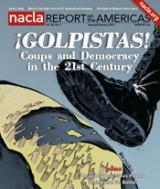Report
The Ecuadoran government's official narrative that conspiratorial forces attempted to overthrow the Correa administration in September transforms the administration's democratic adversaries—including the leaders of social movements—into irreconcilable enemies. The rebellion, in fact, was the logical consequence of the Correa government's attempt to do away with long-standing "corporatist" privileges as a part of its anti-neoliberal platform, while excluding popular participation in that process.
Haiti's election debacle of November 28 can be directly linked to the 1991 and 2004 coups. The political upheaval in both cases allowed the de facto president to unilaterally select members of the electoral council, bypassing constitutional provisions requiring popular representation. The result this time: the arbitrary banning of 14 political parties, including Haiti's largest and most representative, the Fanmi Lavalas party of ousted, exiled former president Jean-Bertrand Aristide.
The Honduran coup is best understood within the long-term struggle for meaningful democracy and economic justice—not only in Honduras but on the Central American isthmus. This is reflected in the fact that the coup was precipitated by both growing popular demand for a constituent assembly and a modest increase in the country's minimum wage.
The opposing sides in the 2002 Venezuelan coup harnessed the particularities of the country’s ideology of democratic governance, which developed a historical emphasis on balancing and protecting the nation's "two bodies"—its social body (the citizenry) and its natural body (natural resources, especially oil). One of the coup's most important consequences has been the strengthening of respect for democratic procedures throughout Venezuela's political spectrum.
@font-face {
font-family: "Verdana";
}@font-face {
font-family: "Cambria";
}@font-face {
font-family: "Berkeley-Book";
}p.MsoNormal, li.MsoNormal, div.MsoNormal { margin: 0in 0in 0.0001pt; font-size: 12pt; font-family: "Times New Roman"; }p.TextParagraphIndent, li.TextParagraphIndent, div.TextParagraphIndent { margin: 0in 0in 0.0001pt; text-align: justify; text-indent: 0.15in; line-height: 12pt; font-size: 10pt; font-family: Berkeley-Book; color: black; }div.Section1 { page: Section1; }We have collected in this Report a series of articles analyzing these 21st-century coups in the Americas—in Venezuela (2002), Haiti (2004), and Honduras (2009)—against the backdrop of popular movements for democracy and economic justice.The fight to overcome neoliberalism in the region has produced not only left-leaning governments but, perhaps more significantly, a widespread, commonsensical respect among citizens for transparent, democratic norms and institutionality. Coups are seen as an extra-legal retrogression to a barbarous past. The dark days of the region’s late-20th-century military dictatorships, which came to power through U.S.-sponsored coups, comprise a sinister legacy that continues to inform how leaders and social movements in the region frame current events. Coups, and the threat of coups, are still a part of the Latin American reality, even in the 21st century.

